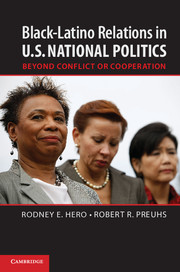Book contents
- Frontmatter
- Contents
- List of Tables and Figures
- Preface
- Acknowledgments
- Abbreviations
- 1 Introduction
- 2 What Previous Research Tells Us about Black-Latino Relations
- 3 Black-Latino Relations in Congressional Testimony and the Legal Arena
- 4 Salience and Congruence in Policy Positions
- 5 Black-Latino Relations in the U.S. House of Representatives
- 6 The Role of Group Interests and Ideology in Cross-Group Support
- 7 Further Explorations of Black-Latino Relations and Policies in National Politics
- 8 Conclusions
- Bibliography
- Index
7 - Further Explorations of Black-Latino Relations and Policies in National Politics
Published online by Cambridge University Press: 05 February 2013
- Frontmatter
- Contents
- List of Tables and Figures
- Preface
- Acknowledgments
- Abbreviations
- 1 Introduction
- 2 What Previous Research Tells Us about Black-Latino Relations
- 3 Black-Latino Relations in Congressional Testimony and the Legal Arena
- 4 Salience and Congruence in Policy Positions
- 5 Black-Latino Relations in the U.S. House of Representatives
- 6 The Role of Group Interests and Ideology in Cross-Group Support
- 7 Further Explorations of Black-Latino Relations and Policies in National Politics
- 8 Conclusions
- Bibliography
- Index
Summary
There is a very limited body of previous scholarship on minority intergroup relations in national politics; it describes just a few issues and examines a limited range of evidence. Furthermore, these works are seldom guided by theoretical frameworks attentive to potential differences in how policies and intergroup relations might vary across levels of government. As demonstrated in this book thus far, examining the national level systematically and in several ways and different venues reveals virtually no evidence of minority intergroup conflict; this stands in some contrast to what has often been identified in the urban politics and similar research literatures. In this chapter we supplement our previous analyses in Chapters 3–6 with a broad overview and description of black-Latino relations on several public policy issues and thus further explore whether and how the relations between the two minority groups may vary across policy issues at this level of government. The evidence from the examples we assess here is consistent with what we have found to this point: virtually no indication of conflict, but indications that the groups often act independently. These assessments notwithstanding, several prior studies of black-Latino relations at the national level suggested something different from what we have reported; we begin by noting those other claims.
Vaca’s (2004) analysis of the “presumed alliance” between Latinos and blacks identified several instances where the two groups had diverged on major federal legislation in the past. The 1975 law extending the landmark Voting Rights Act of 1965 ultimately addressed “language minority” and Latino concerns in its final version but did so over the initial objections of the NAACP. The NAACP felt the addition of language provisions (and inclusion of Latinos, and others) would undercut the previous legislation’s central focus on blacks and the effectiveness as intended in the original 1965 law. Similarly, some members of the Leadership Conference on Civil Rights (LCCR), a group closely linked to black interests (especially at the time), succeeded in revising the language assistance provisions of the 1985 voting rights legislation which “directly affected Latinos and other minorities in such a way as to reduce its coverage for language groups.” Efforts in Congress in the mid-1980s to make English the “official” language of the United States, while ultimately defeated, were only nominally opposed at the outset by certain civil rights groups, including the LCCR, according to Vaca.
- Type
- Chapter
- Information
- Black–Latino Relations in U.S. National PoliticsBeyond Conflict or Cooperation, pp. 181 - 213Publisher: Cambridge University PressPrint publication year: 2013



